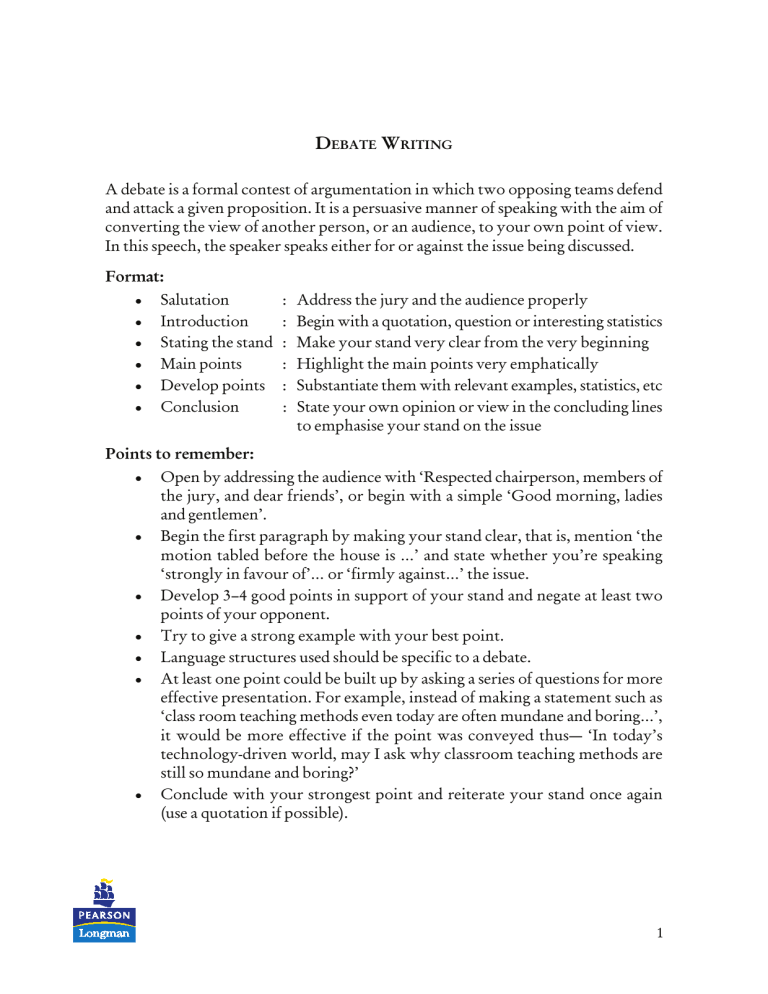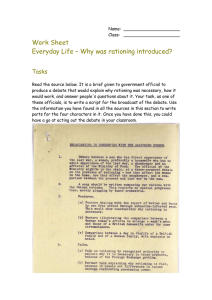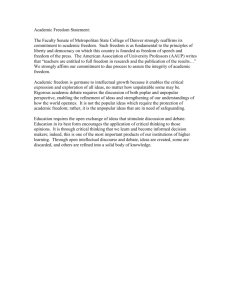
DEBATE WRITING A debate is a formal contest of argumentation in which two opposing teams defend and attack a given proposition. It is a persuasive manner of speaking with the aim of converting the view of another person, or an audience, to your own point of view. In this speech, the speaker speaks either for or against the issue being discussed. Format: • • • • • • Salutation Introduction Stating the stand Main points Develop points Conclusion : : : : : : Address the jury and the audience properly Begin with a quotation, question or interesting statistics Make your stand very clear from the very beginning Highlight the main points very emphatically Substantiate them with relevant examples, statistics, etc State your own opinion or view in the concluding lines to emphasise your stand on the issue Points to remember: • • • • • • • Open by addressing the audience with ‘Respected chairperson, members of the jury, and dear friends’, or begin with a simple ‘Good morning, ladies and gentlemen’. Begin the first paragraph by making your stand clear, that is, mention ‘the motion tabled before the house is …’ and state whether you’re speaking ‘strongly in favour of’… or ‘firmly against…’ the issue. Develop 3–4 good points in support of your stand and negate at least two points of your opponent. Try to give a strong example with your best point. Language structures used should be specific to a debate. At least one point could be built up by asking a series of questions for more effective presentation. For example, instead of making a statement such as ‘class room teaching methods even today are often mundane and boring…’, it would be more effective if the point was conveyed thus— ‘In today’s technology-driven world, may I ask why classroom teaching methods are still so mundane and boring?’ Conclude with your strongest point and reiterate your stand once again (use a quotation if possible). 1 Marking scheme Salutation — 1 mark Opening statement — 1 mark Body — 2 marks Concluding statement — 1 mark Sample debates: 1. On the National Debate Forum, the topic given to the students is ‘Should college students or even Class XII students be given unlimited freedom?’ Write a speech for or against the topic in about 200–250 words. Good morning, ladies and gentlemen, Teenage proclaims itself near adulthood. So shouldn’t a teenager be allowed to probe the mysteries of the world all on his/her own? The modern environment and educational facilities surely enable that. However, I strongly feel that some kind of guidance is necessary for their young and impressionable minds. It is true that the modern world offers a variety of opportunities for all age groups in all the fields of knowledge, and everything is accessible at the click of a button. But, with one click on the wrong button, one could get access to harmful knowledge. Therefore, there needs to be some kind of control over the kind of freedom a teenager enjoys. One could argue that aren’t teenagers capable of deciphering the good from the bad as they are on the threshold of adulthood? I agree with this thought but too much curiosity can lead to added confusion, and even chaos. Some kind of parental guidance should be exercised on teenagers regarding the kind of movies to be watched, the books to be read, friends to have, etc. Some of us may strongly protest as to why can’t we be on our own and enjoy life. But the truth is that the world consists of both good and bad things and teenagers are not in a position to differentiate between the grey areas amidst good and bad. So the parents’ guidance to a certain extent is essential. Therefore, I think that while creative urges and the inquisitiveness of teenagers about the goings-on in the world should not be suppressed with too much parental interference, teenagers, on their part should not insist on complete freedom to make their choices in life. Thank you. 2 2. You are Ashutosh/Anamika Malik. You have to speak in a debate against the motion, ‘We do not need Mathematics’. Prepare a speech of about 150–200 words. Good morning, ladies and gentlemen, I, Ashutosh/Anamika, strongly oppose the motion that ‘We do not need Mathematics’. Does my knowledgeable opponent believe that Mathematics means only working on complex mathematical models? Or that it is an activity indulged in only by those with a lot of time on their hands? Or that it is of no use to those who, apparently, have better things to do? On the contrary, Mathematics has always been—and will remain—a part of our lives. I should like to draw attention to the fact that almost everything we do— from buying a bar of chocolate to reaching the movie hall on time—involves Mathematics. At a cricket or a football match, what is score-keeping but the arithmetical form of Mathematics? While building a house, right from the planning stage, we need Mathematics in its various forms, such as arithmetic, algebra, geometry and trigonometry. We need Mathematics to keep track of our day-to-day expenses too. I therefore firmly reject the view that we do not need Mathematics. In my opinion Mathematics is an important field of study in modern life. Thank you. 3 WORKSHEET 5 1. Prepare a debate for or against the motion ‘The advent of technology like the internet and computers means the end of books.’ 2. Using your own ideas along with the ones given below write a debate for/ against the topic, ‘The present examination system in India fails to test a student’s calibre’. Exams cause unnecessary stress No weightage to sports or co-curricular activities Indian intellect has been toughened and honed by our examination system How do we evaluate quality without formal test? 3. Write a debate for/against the topic, ‘The generation gap is destroying family tradition and life.’ 4. ‘Children should not be allowed to have their own cell phones’. This was the topic for a debate conducted between the different sections of Classes 6–8 of your school. You spoke against the motion. You included points like: cell phones help children to let their parents know where they are • parents can contact their children easily • a lot of tension is eased because of easy communication • young people can stay in touch with their friends Write the debate that you delivered in not more than 150–200 words. • 5. You are taking part in a debate on ‘Should school children be compelled to wear uniforms?’, organised by the Debate Club of your school. Prepare a speech of 150–200 words supporting/opposing the motion. 6. ‘Let’s junk all junk food’ is the topic of an inter-house debate that you are taking part in. You are speaking for the motion. Write in 150–200 words the speech you plan to deliver. You may include the following points besides your own ideas: • • • • we tend to eat junk food at any time of the day it makes us lose our appetite for mealtimes it does not provide well-balanced nourishment it encourages obesity 4


